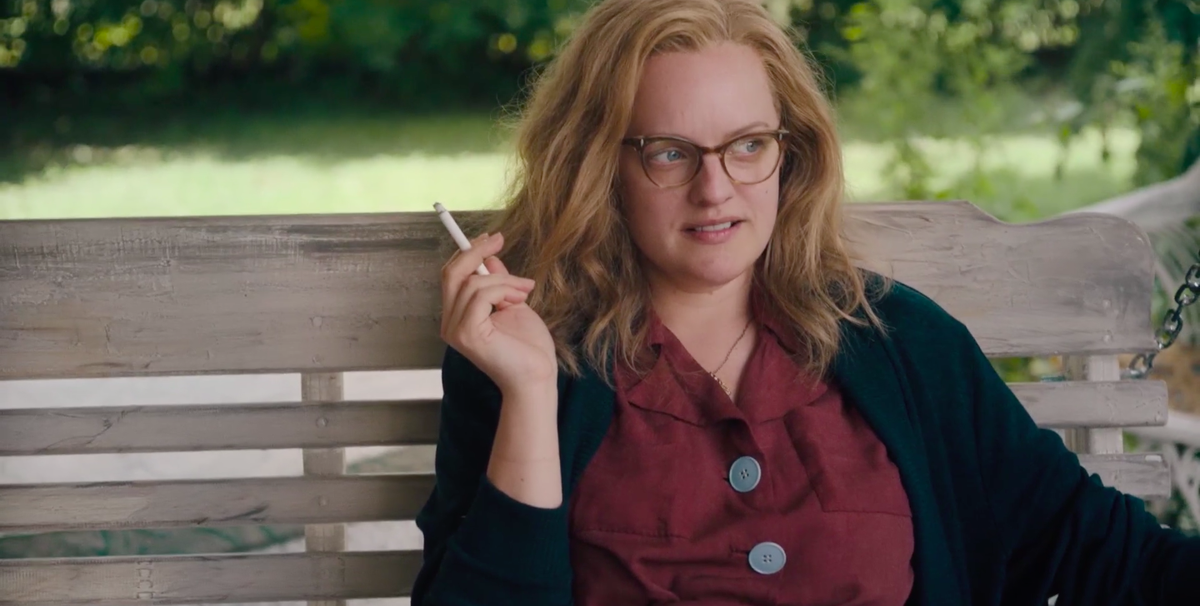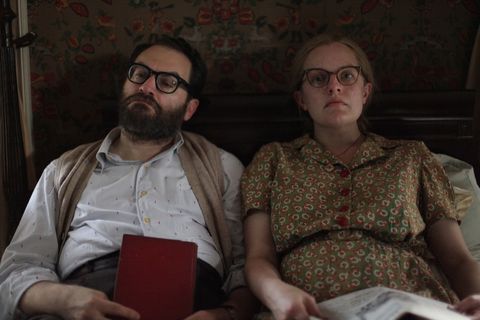As Shirley Jackson, Elisabeth Moss seethes with righteous anger. Following an astounding performance in The Invisible Man, she stars in Shirley, a semi-fictional look at the famed horror author. In the film, Shirley induces visceral fear with cutting insults and a staggering disregard for social norms. But over Zoom, Moss is a friendly, laughing delight who commiserates over our shared inability to master videoconferencing.
Shirley focuses on the period of Jackson’s life when she worked on the 1951 novel Hangsaman and lived in North Bennington, Vermont, with her husband, critic and Bennington College instructor Stanley Edgar Hyman (played by Michael Stuhlbarg). Jackson suffered from anxiety and colitis and felt isolated and judged by the small town community; in the film, this manifests in her hostile behavior, particularly toward Fred (Logan Lerman) and Rose (Odessa Young), a young couple who comes to stay with them. The movie’s horror overtones are reminiscent of Jackson’s work, placing it fully in Moss’s oeuvre, which is full of sharp works exploring darkness like The Handmaid’s Tale and Us. Next up, a newly announced miniseries in which she’ll play Texas murderer Candy Montgomery.
Moss spoke to ELLE.com about embodying Jackson, why great films transcend the horror genre, and finding an audience at home.
What went into the role? You are transformed, which is fascinating.
I read this incredible script written by Sarah Gubbins, and it was one of the best scripts I’d ever read. It was so beautiful and I desperately wanted to do it. I had to wait a second to see if they wanted me, and I will never forget when I got the call that they did.
Then I got the best scene partner a gal can have with Michael Stuhlbarg. I would just sit and watch him. Sometimes I would forget we were doing a scene because I would be watching him and absorbing his brilliance. We did a lot of work together before we started; we read all these incredible letters between Shirley and Stanley, a lot of books, and all her stories and his work as well. It was a really immersive process. We worked on this incredible dialect that Shirley had, and then we had the padding underneath the costume and the hair and makeup to make me look a little bit older.
What a character. She’s so fierce.
She really is. I have so much admiration for her. She was such a strong, ahead-of-her-time woman who didn’t prescribe to any of the norms of what would be expected of a wife and mother and woman.
It seems like it would be incredible to play somebody like that, and maybe indulge in the things you might not get into as an adult in real life.
I hate the idea that we have to be polite as women, or we have to be docile. It’s good to be kind, of course, but that we have to be agreeable, and if we’re anything else we’re labeled difficult. I very much object to that. It was really fun to play somebody who was like, fuck that, I’m great writer. I don’t give a shit about if anybody likes it.
This isn’t horror, exactly, but it’s near the genre, and the books she wrote are horror. Is that something that appeals to you, given how much you’ve done in that realm?
I suppose I’ve always had a high tolerance for dark and scary material. I’m not a very fearful person. What I love about Shirley’s work is, like most great genre writers or genre filmmakers, it’s very difficult to actually put her in a genre. We naturally go well, okay, horror, but it’s so much deeper and darker than that. It’s so much more emotional and character-driven than that. She defied genre in a lot of ways.
That’s like Jordan Peele.
A hundred percent.
It doesn’t need to be categorized.
I was actually making Us at the same time I was making Shirley. I was going back and forth between New York and L.A. making those movies. It was fun to play Shirley and then do something inspired by her work.
It’s such an interesting concept to do something loosely biographical and put some fiction into it.
It was really important to capture the essence of Shirley as a writer, and there were parts of her life we chose to leave out. It’s not a factual biography of this woman, which we fully acknowledge. We didn’t include her children in the story because of our timeline and because of the story we wanted to do. I know she was a fantastic mother; I know this from reading so much about her. For the purpose of our story, it didn’t make sense because of Rose and everything we were doing there. But I remember meeting her son and being like, “Hey, yeah, sorry about that. We didn’t include you in that one, but it’s based on this book and we were following the book.”
This was released on demand, which is probably a bit different from your expectations for it. But Invisible Man had a lot of success there. How do you revise your expectations for what makes a film a success, or what you hope it does, when the release for everything is so changed?
With something like Invisible Man, I’m very happy it at least had two or three weeks in theaters. It’s important to see a movie like that on the big screen. Then it had this whole life on demand. With a movie like Shirley, because it’s a smaller film, so many people are going to watch that way anyway. And at the same time, we wanted to make sure it still qualified under certain guidelines. I had a really wonderful chat with the president of Neon; we talked about how it doesn’t make any sense to not put art out into the world right now. It’s not the time to cut people off from storytelling. I really respect that.
This content is created and maintained by a third party, and imported onto this page to help users provide their email addresses. You may be able to find more information about this and similar content at piano.io

